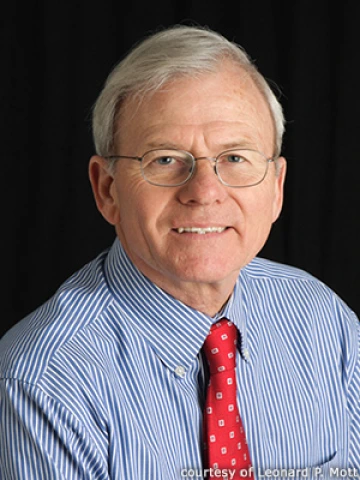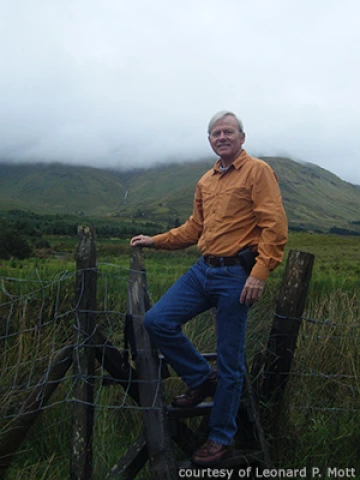Etendue: Leonard P. Mott
Welcome to Etendue, featuring interesting and accomplished individuals known for their leadership and contributions both with their careers and the College of Optical Sciences, in their own words. (For a similar view on the college’s best and brightest – our students – please check out Another Wavelength among our Students in the Spotlight.)
This week, we hear from Leonard P. Mott, M.S. 1971.

Where are you from?
I was born in Bridgeport, Connecticut, and grew up in nearby Westport. After graduating from Staples High School, I attended Hobart College in Geneva, New York, earning a B.S. in physics in 1966. My education at the University of Arizona included an M.S. in optical sciences awarded in 1971 and an MBA in management awarded in 1977.
Who or what influenced your interest in optics?
My physics professor at Hobart College, John Hovorka, was an inspirational teacher. He awakened my interest in optics and helped me find my first optical engineering job at Perkin-Elmer Corp. There, I was fortunate to work with many capable people, including Morley Lipsett and Russell Austin, and to work on fascinating projects, including filters for the Skylab solar telescope. There were professional connections at that time between Perkin-Elmer and faculty members at the Optical Sciences Center, which resulted in my decision to pursue further education in optics. My career has strongly benefited from the advice and guidance of my thesis advisor, Dean McKenney, and the mentorship of Francis Turner.

Describe your career.
My career has been centered on thin films optics, both as an engineer and as a manager. At Optical Coating Laboratory Inc. in California I worked on a wide range of thin film projects, including camera optics for the Mariner spacecraft. I was motivated to become more involved in technical management, so I returned to the University of Arizona to pursue an MBA in management. Over the next 20 years, I held technical and general management positions at OCLI and Spectra-Physics, before joining with Gary DeBell and Tony Louderback to form MLD Technologies and DiMaxx Technologies.
Describe your current job.
I am still actively engaged in the management of MLD and DiMaxx, and working to develop business opportunities in the world of optics and photonics. MLD specializes in high-performance optical coatings and components, while DiMaxx is a supplier of precision optics and CNC-machined glass parts. The manufacturing operations for both companies are located in the United States, where we employ about 50 people. Our business philosophy for 18 years has been to provide optics with the highest performance and value for our customers in the medical, aerospace and research markets.
Share your single best OSC experience.
My interest at the Optical Sciences Center was in thin film optics, and I had the good fortune that Francis Turner became my friend and mentor. Francis was extraordinarily generous in sharing his knowledge and his eye-witness accounts of the pioneering days in this area of optical technology that he helped create.

Why is staying involved with OSC important to you? How are you involved?
My educational experience at OSC has served me well for my entire career. I will be forever grateful for the opportunity to learn from an outstanding and dedicated faculty, and to share in the excitement of being at the University of Arizona when the Optical Sciences Center was still a new idea. Through the inclusive efforts of Dean Koch and Kaye Rowan, I have felt reconnected to OSC again in recent years. I have especially enjoyed visiting and seeing all the new, world-class facilities. [Editor's note: In sincere appreciation for his friend and mentor, Len and his wife made a thoughtful donation to name the college's thin films laboratory for Arthur Francis Turner.]
Name one neat fact about you.
My wife, Nancy, and I are restoring the Corvette Roadster that we bought new in 1965. If you see a bright red ’65 Corvette driving around Tucson with the top down, it might be us.
